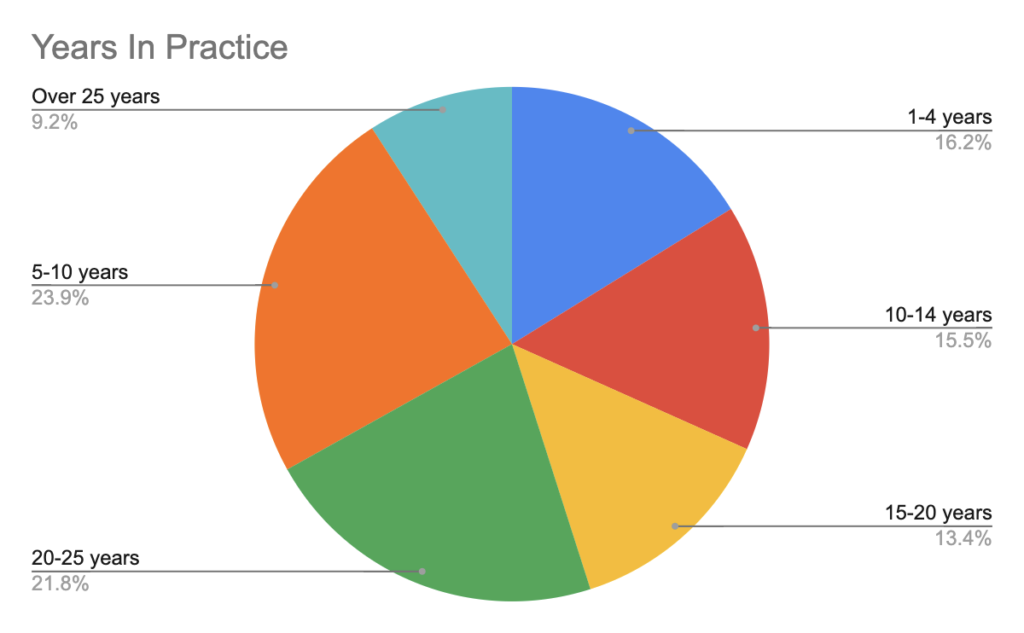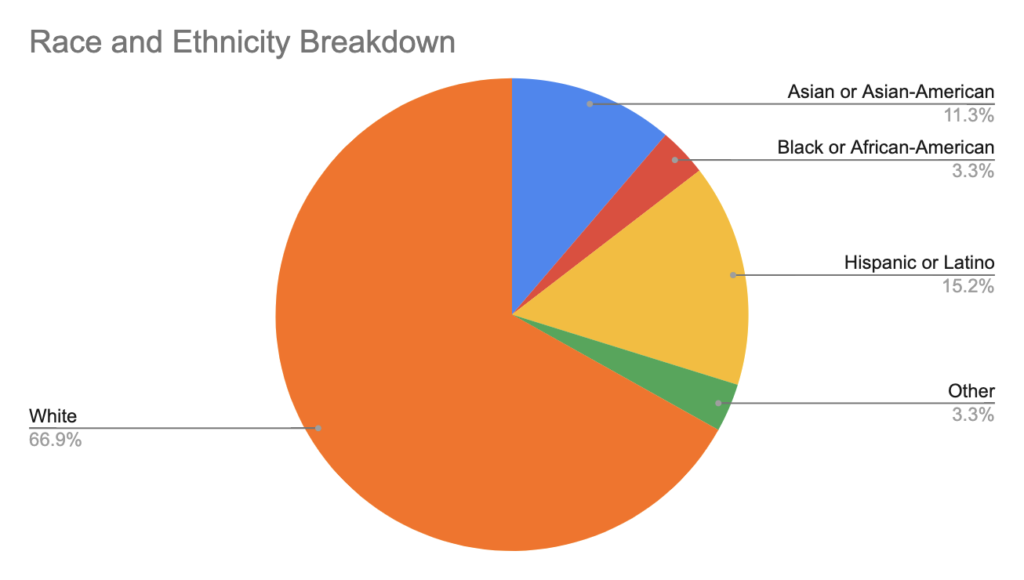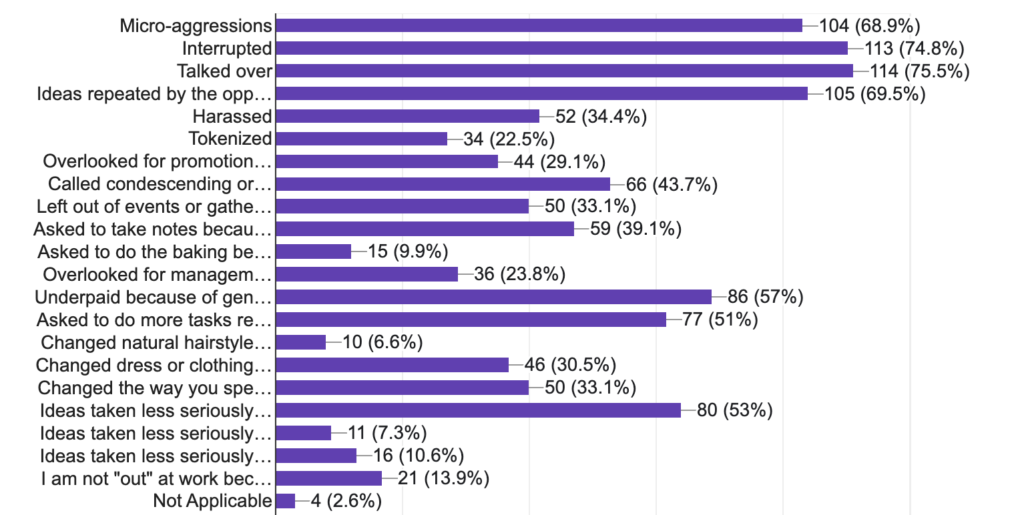I recently ran a relatively non-scientific, biased towards negative experiences, survey seeking opinions from women working in user experience. The survey was shared on twitter, LinkedIn and on my website and was then shared by community members out to their networks. It was intended to capture stories from people who identify as women in the UX super discipline which includes managers, user researchers, UI and visual designers, interaction and product designers, content strategists and writers and any others who believe they work within the UX space.
About 170 people started the survey which kicked out male identifying people after the first two questions, leaving 151 total respondents.
General demographic information
The tenure in the field of the women who completed the survey fell along these lines:

16.2% were in their early career, 1-4 years
23.9% have worked 5-10 years
15.5% were 10-14 years
13.4% were 15-20 years
21.8% have worked 20-25 years
9.2% were OG having worked over 25 years in the field.

The racial and ethnic background breakdown of the respondents - apologies if I use the wrong terms
66.9% White
15.2% Hispanic or Latinx/a
11.3% Asian or Asian American
3.3% Black or African American
3.3% Other - which included Middle Eastern and Native American—respondents filled out their specifics.
When looking at other intersectional identity facets, I asked about ability, long lasting or chronic conditions (physical, visual, auditory, cognitive or mental, emotional, or other) that limits activities (including ability to see, hear, or speak; to learn, remember, or concentrate).
72.8% said No
24.5% said Yes
2.6% preferred not to answer
Results about specific experiences
When I started to dig into the experiences in the workforce close to 70% said they had experienced micro-aggressions. Nearly 75% have been interrupted and talked over. 70% have had their ideas co-opted and repeated by the opposite sex.

Almost a third believe they have been overlooked for promotion, left out of events or gatherings, and overlooked for management because of their gender and/or race.
22.5% feel they have been tokenized while 34.4% have been harassed, with 30% changing how they dress, how they speak (33.1%), or have changed their hair (6.6%) to fit the expectations of the workplace.
Other situations mentioned included ideas taken less seriously, being asked to clean up, get coffee, bring cake, cut the cake, and mansplained.
In aggregate, over 30% changed something about themselves, dress, hair, speech, in order to fit in to the group they were working within.
Who has been inflicting these harms?
Respondents told stories about being harassed, being hit on at professional conferences, being left out of team offsites like golf. They experienced the majority of these experiences from engineering colleagues (46.4%), product managers (45.7%), and their direct managers (55%).
I had hoped that the advent of the Me Too movement in the last several years would have shown an improvement in the way women are treated in the workforce but it doesn’t seem to be.
Women of color, non-binary and queer women experienced more of these issues than white women overall.
Other factors
Most of the women felt that having children or being pregnant negatively affected their job security and advancement—of being slow-tracked or channeled to less demanding roles.
Women in the over 25 years experience category also spoke about experiencing agism and topping out in their positions after being passed over for promotions.
When women step up and exhibit the same behaviors and ambition shown by men, they are punished, being called aggressive or “thinking a lot of herself” or told to talk less.
Studies have shown that there is a double standard to how women are treated in the workforce and this small microcosm look into the UX discipline bears that out.
Several women talked about being bold and also encouraging cooperativeness to mitigate these behaviors as well as being fierce in their career advancement to the point of moving companies in order to move up.
Pay equity or lack thereof
None of these issues even get to the pay equity problem. Women are generally paid less than men for the same work. The situation holds onto the belief from last century that the man was the breadwinner and needs to be able to support his family. This belief doesn’t take into consideration single women supporting themselves, single mothers supporting their families or even women who are the primary breadwinner for their families regardless of marital status or the fact that salaries haven’t kept up with inflation. Additionally, in most cities it take two incomes to survive.
We don’t talk enough about salaries - whether an annual salary or hourly rate - if we had more transparency, it would be easier to recognize and call out the inequities across gender and race in the money department.
Older women were fairly certain they had been overlooked and passed over for promotions, often being promoted at a much slower rate than their male counterparts. In some cases, they explicitly mentioned being told by their bosses, that a male working FOR them was going to be promoted OVER them. Younger women weren't sure citing 'you don't know what you don't know' when commenting on promotion and raises.
Some final thoughts on the methodology
There were definitely issue with my survey - I am not a quantitative research specialist - and unlike other parts of UX, it is really hard to design, test, and iterate a survey - because once it is out there and people are responding, it’s hard to change. I also recognize that not all my vocabulary was correct —several people corrected me early on and i was able to make small changes before there were too many respondents. Looking back on it, I would separate out some of the questions, some of the demographic categories and would allow people to share multiple experiences across multiple workplaces, answering some question more than once to give me cleaner data.
I also filtered out gay men, and in hindsight, it would have been interesting to compare answers. Where does being male gain privilege over being gay and where does being gay take precedent in terms of potentially negative career experiences?
If anyone is interested in helping me craft a new version of this survey to run, feel free to DM me.
Some final thoughts on the findings
We have a problem, still.
Behaviors that were inflicted on women at the beginning of their careers, at the beginning of this field, have not improved. New women entering the field are experiencing the same micro-aggressions, harassment, subtle patronization and undermining commentary as women did 25 years ago. Non-white respondents experienced more layers of harm and harassment on top of the gendered harassment, often being the only one who looks like them on a team, and not having any kind of internal support system.
While women are on the receiving end of most of these harms, micro-aggressions, and equity issues, they can also be perpetrators. White women have been indoctrinated into the patriarchy and can be the worst supporters of other women. This was less called out in the comments, but it did come up.
There is a lot of work to do inside our workplaces to create more inclusive and nurturing environments. We need to work on celebrating the work and the people who make the work regardless of who they are and how they get things done. Strong women are not aggressive or bossy. They just get stuff done in different ways. New ideas come from divergent backgrounds and experiences and the old way is not always the best way or the right way to do something. If we are designing for broad populations of people, then our teams need to reflect that and have the same level of respect that we give our customers.
It’s also important to reflect within our design teams the behavior we want to see from other team members outside our discipline. Change is slow but modeling best practices can work, especially if we call out the bad practices. Many of the comments indicated that we often let bad behavior slide because we know nothing will happen if we call it out. The only reason why MeToo has been as successful as it has been - although still needing progress - is that people stepped up. Call out the bad behavior if you can. Don’t hide or accept the bad actors.
The only way we can stop this systemic problem is to work all the angles and that means calling it out when it happens, modeling good behavior, considering whether or not what you say is appropriate - if you wouldn't say it to your mom or sister, don't say it to a colleague. Treat women with the same respect as men. Support your colleagues the same way you expect to be supported.
Male allies need to call out bad behavior as well. It can’t just be up to the women to fix things. Fight for pay transparency and equity. Be as ambitious with your colleagues careers as your own—champion the women on your team. This is a community issue and needs community action.
We need to do better.
